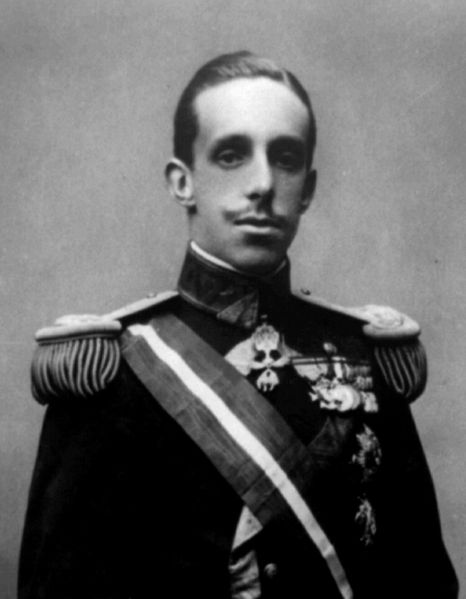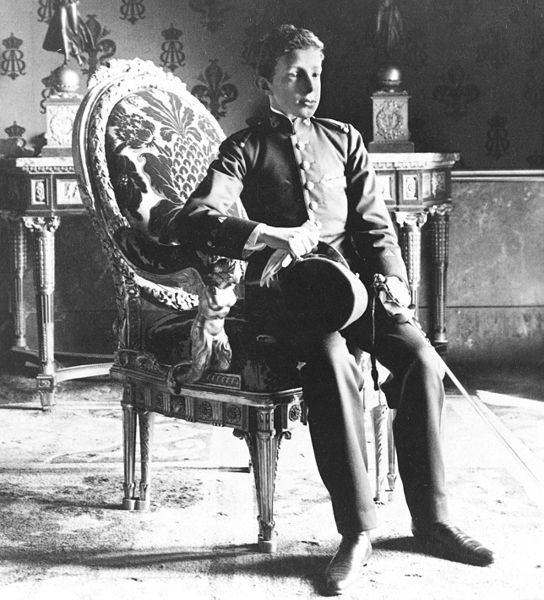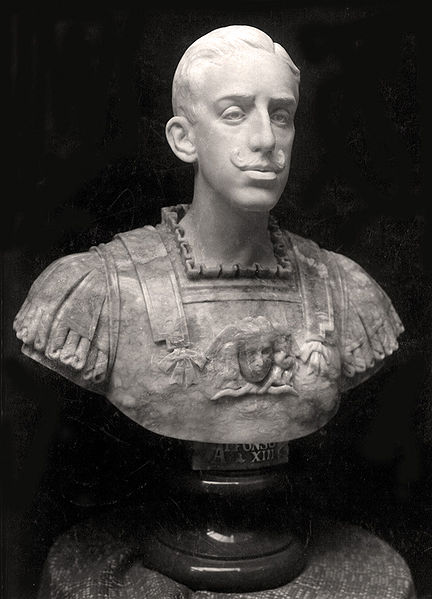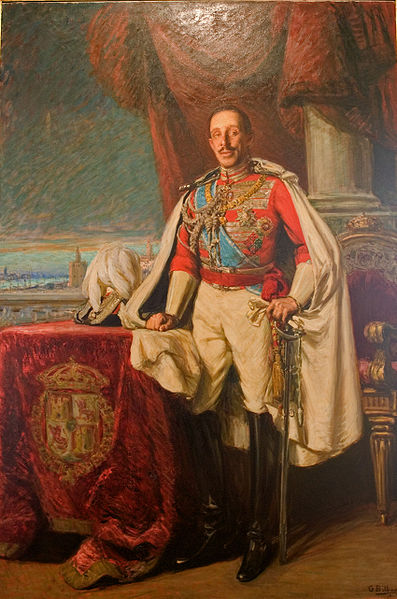<Back to Index>
- Surgeon and Anatomist Edward Anthony Jenner, 1749
- Painter Alessandro di Mariano di Vanni Filipepi (Sandro Botticelli), 1445
- King of Spain Alfonso XIII, 1886


Alfonso XIII (Alfonso León Fernando María Jaime Isidro Pascual Antonio de Borbón y Austria-Lorena) (Madrid, 17 May 1886 – Rome, 28 February 1941), King of Spain, posthumous son of Alfonso XII of Spain, was proclaimed King at his birth. He reigned from 1886-1931. His mother, Queen Maria Christina, was appointed regent during his minority. In 1902, on attaining his 16th year, the King assumed control of the state.
Alfonso's reign began well. The French newspaper Le Figaro described the young King as "the happiest and best-loved of all the rulers of the earth". When he came of age in 1902, the week of his majority was marked by festivities, bullfights, balls and receptions throughout Spain.
During his reign, Spain lost its last colonies in the Americas (Cuba and Puerto Rico) and the Philippines; fought and, after several setbacks, won a war in Morocco; witnessed the start of the Spanish Generation of 1927, and endured the dictatorship of Miguel Primo de Rivera, which ultimately cost him the throne.
During the First World War, because of his family connections with both sides and the division of popular opinion, Spain remained neutral. The King ran an office for captives from the Palacio de Oriente, which leveraged the Spanish diplomatic and military network abroad to intercede for thousands of prisoners-of-war, receiving and answering letters from Europe. However, he became gravely ill during the 1918 flu pandemic and, since Spain was neutral and thus under no wartime censorship restrictions, his illness and subsequent recovery were covered world-wide, giving the false impression (in the absence of real news from anywhere else) that somehow Spain was the most-affected area. This ultimately led to the pandemic getting the nickname "the Spanish Flu."
Alfonso was a promoter of tourism in Spain. The problems with the lodging of his wedding guests prompted the construction of the luxury Hotel Palace in Madrid. He also supported the creation of a network of state-run lodges (Parador) in historic buildings of Spain. His fondness for the sport of football led to the patronage of several "Royal" ("Real" in Spanish) football clubs such as Real Sociedad, Real Madrid, Real Betis, and Real Unión.
When the Second Spanish Republic was proclaimed on 14 April 1931, he fled and left Spain, but did not abdicate the throne. He settled eventually in Rome where he lived in the Grand Hotel.
Once the Spanish Civil War broke out, Alfonso made it clear he favoured the military uprising against the Popular Front government, but General Francisco Franco in September 1936 declared that the Nationalists would never accept Alfonso as King (the supporters of the rival Carlist pretender made up an important part of the Franco Army). First, he went into exile in France. Nevertheless, he sent his son, Juan de Borbon, Count of Barcelona, to enter Spain in 1936 and participate in the uprising. However, near the French border, General Mola had him arrested and expelled from the country. On 15 January 1941, Alfonso XIII abdicated his rights to the Spanish throne in favour of his third (of four), but second-surviving, son Juan, father of the current King, Juan Carlos. He died in Rome a month-and-a-half later. The Spanish Government ordered three days of national mourning. His funeral was held in Rome in the Church of Santa Maria degli Angeli. He was buried in the Church of Santa Maria in Monserrato, the Spanish national church in Rome, immediately below the tombs of Pope Calixtus III and Pope Alexander VI. In January 1980 his remains were transferred to El Escorial in Spain.
On 31 May 1906, at the Royal Monastery of San Geronimo in Madrid, Alfonso married Scottish-born Princess Victoria Eugenie of Battenberg (1887-1969), a niece of King Edward VII of the United Kingdom, and a granddaughter of Queen Victoria of the United Kingdom. A Serene Highness by birth, Ena, as she was known, was raised to Royal Highness status a month before her wedding to prevent the union from being viewed as unequal. As Alfonso XIII and Ena were returning from the wedding, they narrowly escaped an assassination attempted by the anarchist Mateu Morral; instead, the bomb explosion killed or injured many bystanders and members of the Royal procession. Alfonso and Ena had seven children. The King also had four illegitimate children.

